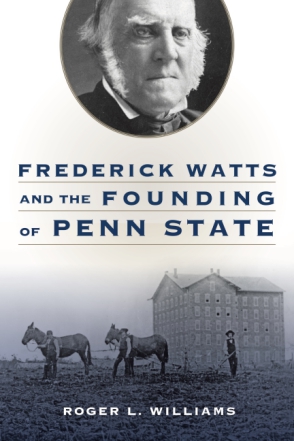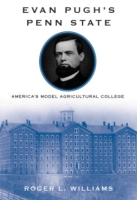Frederick Watts and the Founding of Penn State
Roger L. Williams
“Frederick Watts and the Founding of Penn State makes a compelling case for the national importance of Pennsylvania in nineteenth- and early twentieth-century American social, political, and economic history. It also tells an intriguing, persuasive story that shows how Watts was an influential figure with implications far beyond the particulars of his time and place. Roger L. Williams continues his long record as one of our finest historians of higher education.”
- Description
- Reviews
- Bio
- Table of Contents
- Sample Chapters
- Subjects
This biography explores Watts’s role in founding and leading Penn State through its formative years. Watts adroitly directed the school as it was sited, built, and financed, opening for students in 1859. He hired the brilliant Evan Pugh as founding president, who, with Watts, quickly made it the first successful agricultural college in America. But for all his success in launching the institution, Watts nearly brought it to the brink of closure through a series of ruinous presidential appointments that led to an abandonment of the land-grant focus on agriculture and engineering.
Watts’s influence in the agricultural modernization movement and his impact on land-grant education in the United States—both in his role with Penn State and later as US commissioner of agriculture—made him a leader in the history of agricultural and higher education. Roger L. Williams’s compelling biography of Watts reestablishes him in this legacy, providing a balanced analysis of his missteps and accomplishments.
“Frederick Watts and the Founding of Penn State makes a compelling case for the national importance of Pennsylvania in nineteenth- and early twentieth-century American social, political, and economic history. It also tells an intriguing, persuasive story that shows how Watts was an influential figure with implications far beyond the particulars of his time and place. Roger L. Williams continues his long record as one of our finest historians of higher education.”
Roger L. Williams served as Associate Vice President and Executive Director of the Penn State Alumni Association and as Affiliate Associate Professor in Penn State’s Higher Education Program. He is the author of Evan Pugh’s Penn State: America’s Model Agricultural College and The Origins of Federal Support for Higher Education: George W. Atherton and the Land-Grant College Movement, both published by Penn State University Press.
List of Illustrations
Prologue and Acknowledgements
1. Frederick Watts’s First Fifty Years
2. The Pennsylvania State Agricultural Society
3. Chartering and Locating the New School
4. Building the School and Preparing to Open
5. The Presidency of Evan Pugh
6. Watts and the College After Pugh
7. Final Years with the College and the Aftermath
8. U.S. Commissioner of Agriculture
Epilogue
Appendix
Notes
Bibliography
Index
Download a PDF sample chapter here: Chapter One
Mailing List
Subscribe to our mailing list and be notified about new titles, journals and catalogs.










